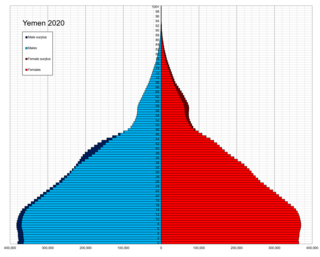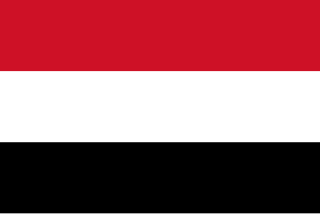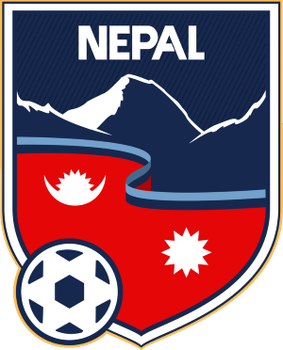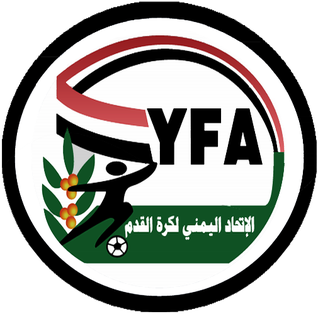
Demographic features of the population of Yemen include population density, ethnicity, education level, health of the populace, economic status, religious affiliations and other aspects of the population.

The foreign relations of Yemen are the relationships and policies that Yemen maintains with other countries. It is a member of the United Nations, the Arab League, and the Organisation of Islamic Cooperation. Yemen participates in the nonaligned movement. The Republic of Yemen accepted responsibility for all treaties and debts of its predecessors, the YAR and the PDRY. Additionally, Yemen acceded to the Nuclear Non-Proliferation Treaty and has stressed the need to render the Middle East region free of nuclear and other weapons of mass destruction.

The Cooperation Council for the Arab States of the Gulf, also known as the Gulf Cooperation Council, is a regional, intergovernmental, political, and economic union comprising Bahrain, Kuwait, Oman, Qatar, Saudi Arabia, and the United Arab Emirates. The council's main headquarters is located in Riyadh, the capital of Saudi Arabia. The Charter of the GCC was signed on 25 May 1981, formally establishing the institution.

Yemen, officially the Republic of Yemen, is a country in West Asia. Located in southern Arabia, it borders Saudi Arabia to the north, Oman to the northeast, the Red Sea to the west, and the Indian Ocean to the south, sharing maritime borders with Eritrea, Djibouti and Somalia across the Horn of Africa. Covering roughly 455,000 square kilometres, with a coastline of approximately 2,000 kilometres, Yemen is the second largest country on the Arabian Peninsula. Sanaa is its constitutional capital and largest city. Yemen's estimated population is 34.7 million, mostly Arab Muslims. It is a member of the Arab League, the United Nations, the Non-Aligned Movement and the Organisation of Islamic Cooperation.

West Asia is the westernmost region of Asia. As defined by most academics, UN bodies and other institutions, the subregion consists of Anatolia, the Arabian Peninsula, Iran, Mesopotamia, the Armenian highlands, the Levant, the island of Cyprus, the Sinai Peninsula and the South Caucasus. The region is separated from Africa by the Isthmus of Suez in Egypt, and separated from Europe by the waterways of the Turkish Straits and the watershed of the Greater Caucasus. Central Asia lies to its northeast, while South Asia lies to its east. Twelve seas surround the region (clockwise): the Aegean Sea, the Sea of Marmara, the Black Sea, the Caspian Sea, the Persian Gulf, the Gulf of Oman, the Arabian Sea, the Gulf of Aden, the Red Sea, the Gulf of Aqaba, the Gulf of Suez, and the Mediterranean Sea. West Asia contains the majority of the similarly defined Middle East. The Middle East is a political term that has changed many times depending on political and historical context while West Asia is a geographical term with more consistency. It excludes most of Egypt and the northwestern part of Turkey, and includes the southern part of the Caucasus.

South Yemen, officially the People's Democratic Republic of Yemen, abbreviated to Democratic Yemen, was a state that existed from 1967 to 1990 as the only communist state in the Middle East and the Arab world. It was made up of the southern and eastern governorates of the present-day Republic of Yemen, including the island of Socotra. It was bordered by North Yemen to the north-west, Saudi Arabia to the north, and Oman to the east.

The Sri Lanka national football team represents Sri Lanka in Association football and is administered by Football Federation of Sri Lanka, the governing body of football in Sri Lanka. They have been a member of FIFA since 1952 and a member of AFC since 1954. Sri Lanka's home stadium is the Sugathadasa Stadium in Colombo. The Sri Lankan team was known as the Ceylon national football team until 1972 when Ceylon was renamed Sri Lanka.

The Nepal national football team represents Nepal in International men's football, and is governed by the All Nepal Football Association (ANFA). A member of the Asian Football Confederation (AFC), the Nepali football team plays their home games at Dasharath Stadium in Kathmandu.

The Yemen national football team represents Yemen in men's international football and is administered by the Yemen Football Association.

The West Asian Football Federation (WAFF) founded in 2001, is a regional sub-confederation of football, governed under the Asian Football Confederation, for nations in West Asia. The WAFF consists of 12 member associations.

Yemenia is the flag carrier of Yemen, based in Sanaa. It operates scheduled domestic and international passenger flights to destinations in Africa and the Middle East out of its hubs at Aden International Airport, and to a lesser extent Seiyun Airport.
The AFC U-20 Asian Cup, formerly known as the AFC Youth Championship and AFC U-19 Championship, is a biennial international association football competition organised by the Asian Football Confederation (AFC) for the men's under-20 national teams of Asia that also serves as a qualification tournament for the FIFA U-20 World Cup. The competition has been held since 1959. Between 1959 and 1978, the tournament was held annually ; since 1980, it has been held every two years. The 1980 AFC Youth Championship had a qualification stage for first time.

The Houthis, also known as the Houthi movement and officially the Ansar Allah, is a Zaydi Shia Islamist political and military organization that emerged from Yemen in the 1990s. It is predominantly made up of Zaydi Shias, with their namesake leadership being drawn largely from the Houthi tribe. The group has been a central player in Yemen's civil war, drawing widespread international condemnation for its human rights abuses, including targeting civilians and using child soldiers. The movement is designated as a terrorist organization by some countries. The Houthis are backed by Iran, and they are widely considered part of the Iranian-led "Axis of Resistance".

The Yemeni civil war is an ongoing multilateral civil war that began in late 2014 mainly between the Rashad al-Alimi-led Presidential Leadership Council and the Mahdi al-Mashat-led Supreme Political Council, along with their supporters and allies. Both claim to constitute the official government of Yemen.

On 26 March 2015, Saudi Arabia, leading a coalition of nine countries from West Asia and North Africa, launched a military intervention in Yemen at the request of Yemeni president Abdrabbuh Mansur Hadi, who had been ousted from the capital, Sanaa, in September 2014 by Houthi insurgents during the Yemeni Civil War. Efforts by the United Nations to facilitate a power sharing arrangement under a new transitional government collapsed, leading to escalating conflict between government forces, Houthi rebels, and other armed groups, which culminated in Hadi fleeing to Saudi Arabia shortly before it began military operations in the country.
Since 2016, a food insecurity crisis has been ongoing in Yemen which began during the Yemeni civil war. The UN estimates that the war has caused an estimated 130,000 deaths from indirect causes which include lack of food, health services, and infrastructure as of December 2020. In 2018, Save the Children estimated that 85,000 children have died due to starvation in the three years prior. In May 2020, UNICEF described Yemen as "the largest humanitarian crisis in the world", and estimated that 80% of the population, over 24 million people, were in need of humanitarian assistance. In September 2022, the World Food Programme estimated that 17.4 million Yemenis struggled with food insecurity, and projected that number would increase to 19 million by the end of the year, describing this level of hunger as "unprecedented." The crisis is being compounded by an outbreak of cholera, which resulted in over 3000 deaths between 2015 and mid 2017. While the country is in crisis and multiple regions have been classified as being in IPC Phase 4, an actual classification of famine conditions was averted in 2018 and again in early 2019 due to international relief efforts. In January 2021, two out of 33 regions were classified as IPC 4 while 26 were classified as IPC 3.

Yemen competed at the 2019 World Athletics Championships in Doha, Qatar, from 27 September–6 October 2019. Yemen had entered 1 athlete.

This page details the match results and statistics of the South Yemen national football team.

The 2022 World Aquatics Championships, the 19th edition of the FINA World Aquatics Championships, were held in Budapest, Hungary, from 17 June to 3 July 2022. These championships included five disciplines, with high diving not staged for this edition of the championships.














